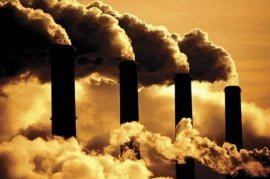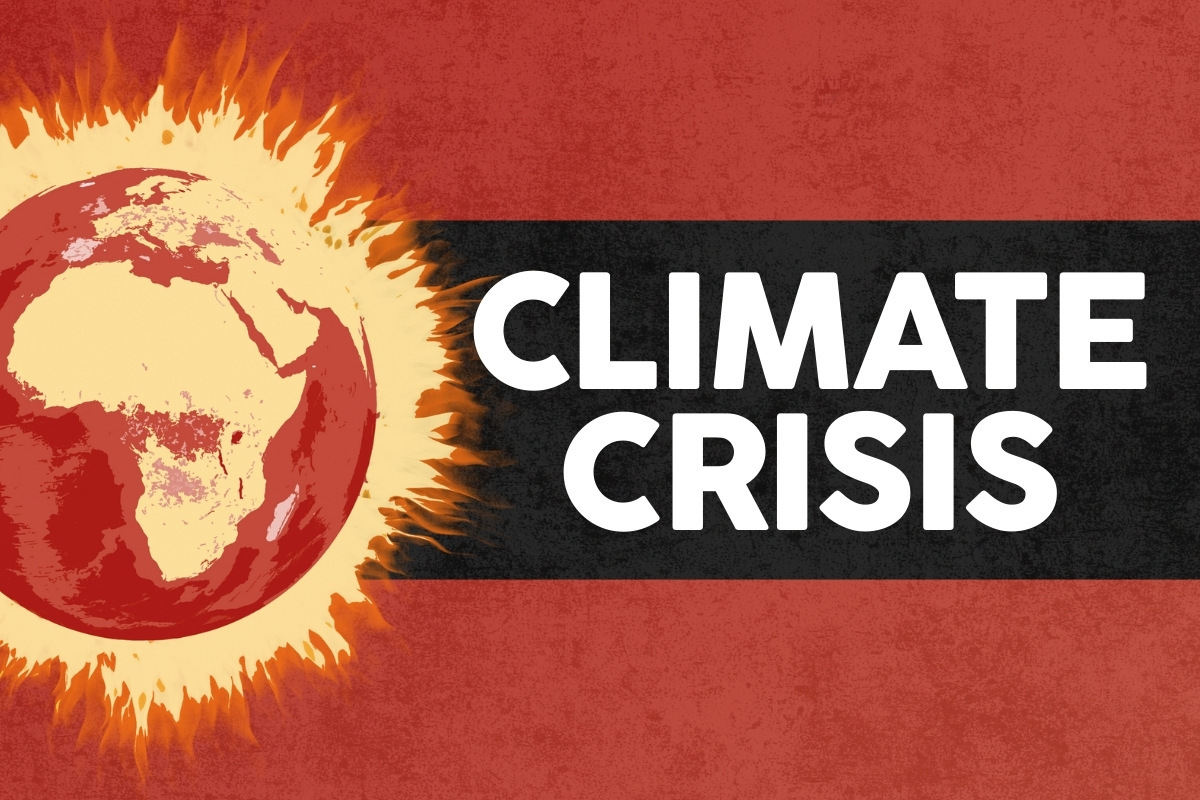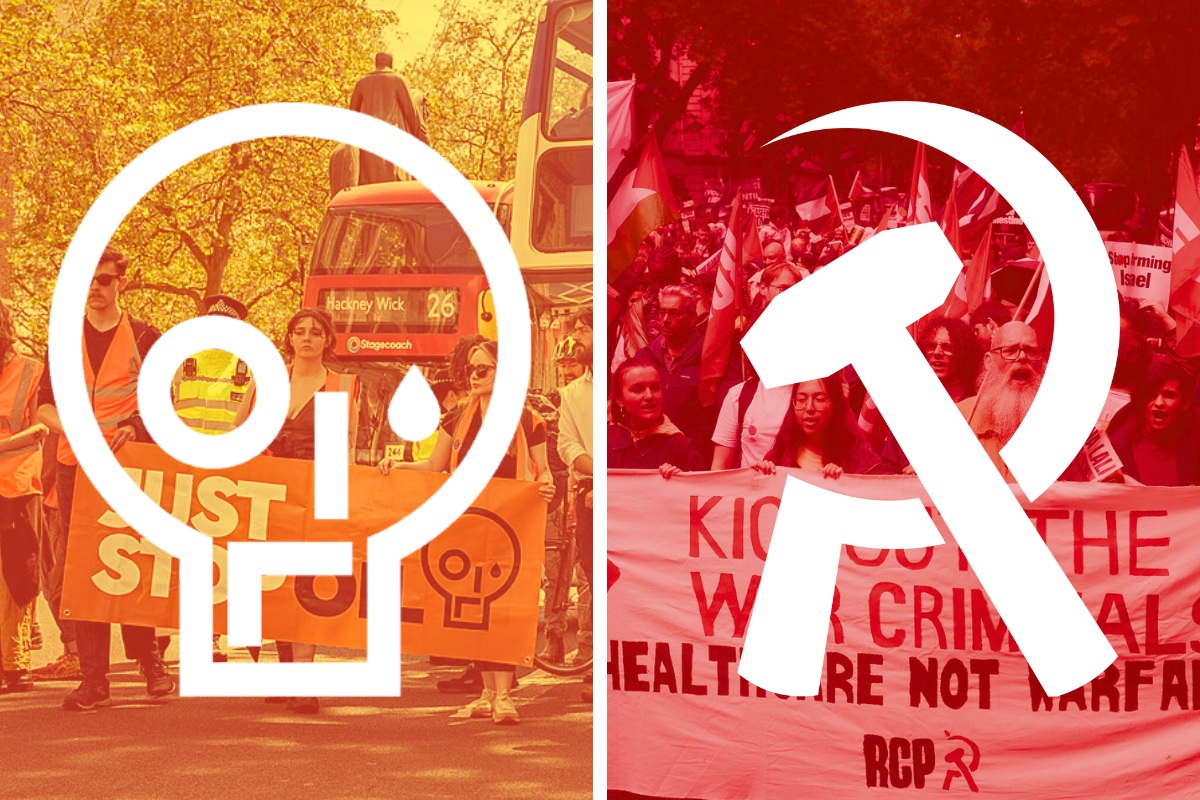In one week’s time, world leaders will meet in Paris for the COP21 United Nations climate change conference. But as bourgeois politicians impotently discuss and negotiate, the atmosphere continues to heat up as capitalism kills the planet. As Adam Booth outlines, the future facing humanity is clear: socialism or barbarism.
In one week’s time, world leaders will meet in Paris for the COP21 United Nations climate change conference. But as bourgeois politicians impotently discuss and negotiate, the atmosphere continues to heat up as capitalism kills the planet. The future facing humanity is clear: socialism or barbarism.
Join Socialist Appeal supporters on the People’s March for Climate, Justice and Jobs in London on Sunday 29th November.
It was said by classical historians that the Emperor Nero “fiddled whilst Rome burnt”. Much the same could be said today, as modern day world leaders do nothing as fires rage in Indonesia.
“Why is this happening?”, George Monbiot – a leading environmental writer – asks in the Guardian (30th October 2015).
“Indonesia’s forests have been fragmented for decades by timber and farming companies. Canals have been cut through the peat to drain and dry it. Plantation companies move in to destroy what remains of the forest to plant monocultures of pulpwood, timber and palm oil. The easiest way to clear the land is to torch it. Every year, this causes disasters. But in an extreme El Niño year like this one, we have a perfect formula for environmental catastrophe.”
The Economist (7th November 2015) elaborates further:
“Indonesia has long suffered from forest fires during the annual dry season. Many are set deliberately, by farmers and firms clearing land for crops such as oil palm. The blazes have grown more serious as agriculture has expanded onto peatlands, which become volatile when drained. But this year’s El Niño has lengthened and intensified the dry season, creating a calamity.”
In short, the anarchy of capitalism, combined with the effects of climate change, has resulted in a seemingly uncontrollable inferno. This is creating an ecological disaster, not only in terms of the damage causes to the local natural habitat, but also to the wider global climate, with some scientific estimates suggesting that the Indonesian forest fires are producing more CO2 emissions daily than the entire US economy. In the space of three weeks, the carbon emissions will exceed that of the German economy’s annual total.
So much hot air
This veritable hell on earth is the backdrop to the 2015 United Nations Climate Change Conference – the 21st yearly session of the Conference of the Parties (COP21) since the establishment of the UN Framework Convention on Climate Change (UNFCCC) in 1992 – which is taking place in Paris between 30th November and 11th December. COP21 marks the latest attempt to reach an international agreement on legally binding targets for reducing greenhouse gas emissions to replace the 1997 Kyoto Protocol, which expired at the end of 2012.
The ultimate aim is to reduce emissions significantly such as to limit global temperature increases to 2°C above pre-industrial levels – a increase that alone will already lead to rising sea levels and increased droughts, amongst other impacts. Indeed, the 2°C figure is a global average, which hides within it more extreme effects for the most vulnerable regions and populations of the world, such as low-lying islands that are threatened with complete submersion.
After the failures of the last major UN Climate Change Conference in Copenhagen in 2009, where the successor to the Kyoto Protocol was supposed to be agreed, many people are understandably sceptical about whether world leaders will do more than just produce some more hot air this time around.
The result of the 2009 Copenhagen was a pathetic “accord”, with no legally binding targets or commitments, worth less than the paper it was written on. Expectations are higher in advance of this year’s Paris conference, with many mainstream commentators talking about the increased “political will” from politicians in the run-up to this latest climate conference (although it should be remembered that similar optimism was seen before the mighty collapse of the Copenhagen negotiations).
The road to hell…
At the centre of this renewed hope are the “Intended Nationally Determined Contributions” (INDCs), emission reduction targets that countries are submitting in advance of COP21. However, UNFCCC analysis shows that even these pledges will only limit the temperature increase by 2100 to 2.7°C – well above the target of 2°C. And this is before the horse-trading between the major imperialist powers in Paris has even begun.
Furthermore, the INDCs are only “intentions” – and as the old saying goes: the road to a very hot place is paved with such good intentions. Even with the best will in the world (something that bourgeois politicians rarely have in any case), it is the laws and logic of the capitalism system – operating behind the backs of the individual agents involved – that will ultimately assert themselves.
In the final analysis, competition and the drive for profit – the forces of the invisible hand – will overpower the good intentions of even the most honest and noble politician, as long as the barriers of private ownership and the nation state remain in place. Nowhere is this shown more acutely as in the case of Tsipras and the so-called “radical left” of SYRIZA in Greece, who are now carrying out cuts worse than their right-wing predecessors; an austerity programme that will have an impact on living standards far worse than even the most extreme estimates for the effects of climate change.
Indeed, even where green regulations and renewable energies are introduced by bourgeois politicians, this has more to do with cynical geo-politics than with any genuine concern for the environment and the lives of ordinary people. For example, the country with the largest solar power capacity is Germany; but Merkel’s infatuation with solar energy is less because of any green sympathies on her part, and more an attempt to reduce the country’s reliance on Russian gas. Similarly, rising trade barriers are now being imposed on Chinese imports into the USA, nominally on the grounds of China’s low environmental standards and regulation, but in reality because of protectionism by the US against Chinese competition.
Just as foreign policy is an extension of home policy, so too it is the case with environmental policy. How can we expect our capitalist governments to carry out policies that will protect the planet and those who rely on its health and stability, when these same governments everywhere – as a result of the crisis of capitalism – are actively pursuing programmes of austerity designed to cut the living standards of workers, the youth, the poor, and the most vulnerable in society?
Moreover, as the Euro crisis and the current refugee catastrophe show, far from seeing international co-operation to solve the problems society faces, we see countries’ leaders today pursuing only the narrow interests of their own capitalist class. And at the end of the day, we cannot rely on these unrepresentative politicians to save the planet, as they already live on a completely different planet from the rest of us.
Socialism or barbarism
The refugee crisis, with ever increasing numbers arriving in Europe looking to escape war and poverty in the Middle East and Africa, has highlighted the toll on human lives that imperialism has created. Increasingly, now, there is talk of “climate refugees”, as people flee drought, famine, and disease. As US Secretary of State, John Kerry, told a climate change conference in Alaska:
“You think migration is a challenge to Europe today because of extremism, wait until you see what happens when there’s an absence of water, an absence of food, or one tribe fighting against another for mere survival.”
It is those countries that are already destitute because of imperialist wars and exploitation that are the most vulnerable to the effects of climate change. Just as the current refugee crisis is a product of imperialism, therefore, so too we see that such droughts and famines – far from being simply “natural disasters” – are also the result of capitalism and its impact on earth’s climate.
The vital question of the planet and the future of our environment is far too important to be left in the hands of capitalist governments and the big business interests that they ultimately defend. As can be seen by the recent Volkswagen scandal, the giant multinational monopolies that dominate the global economy cannot be trusted when it comes to stopping the polluting of our planet.
Indeed, Volkswagen, in their bid for ever greater profits, demonstrated that they were willing to lie to the world, break all manner of environmental regulations, and spew out even more noxious emissions in order to cut costs and outcompete their rivals. The financial crisis of 2008 and all the subsequent scandals surrounding the banks and various tax-dodging corporations highlight the same point on a wider scale: big business cannot be trusted to run society, as they currently do under capitalism.
In the final analysis, you cannot plan what you don’t control; and you cannot control what you don’t own. As long as these banks and major monopolies lie in private hands, it is they that will control governments, not the other way around.
Only by taking over the major levers of the economy can we, for the first time in history, have a real control over our destinies, rather than leaving all the real decisions in the hands of a cabal of unelected bankers and bosses. Only then can we begin to integrate our energy supplies, transport, construction, and food production in order to rid us of poverty, homelessness, and disease. Only then can we begin to implement a rational and democratic plan of production in the interests not of profit, but of people and the planet.





